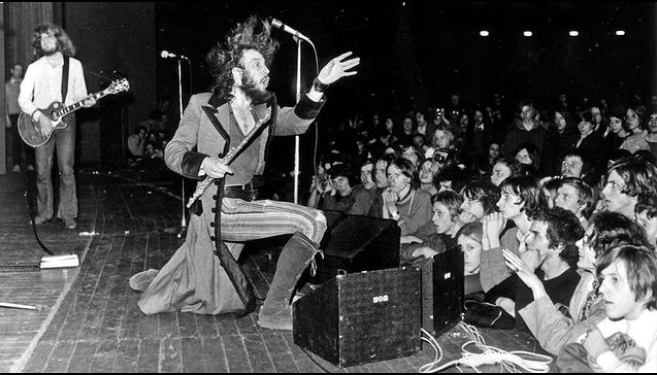Legendary guitarists like Peter Green and Eric Clapton immediately spring to mind. The renowned British rock band Jethro Tull’s lead singer and flautist, Ian Anderson, has offered his opinion on this topic. He spoke about his opinions about the playing techniques of these two guitar masters when appearing on Classic Album Review.
Green was mentioned by Anderson as his guitar idol a few months back during a chat with Classic Rock. Anderson cited Green’s significant effect on Fleetwood Mac in their formative years. Ian claimed that Green had a remarkable talent for making the guitar sound like a human voice. He highlighted how Green could captivate listeners with quality rather than quantity when it came to his playing, complimenting his tone, control, and flexibility.
In a recent interview, Anderson expressed that he thought Peter Green was the finest musician of his generation and once more expressed his admiration for his ability. Ian noted that Green played more thoughtfully and subtly than Clapton, with natural and accurate tonality and phrasing. This difference, however, does not disparage Clapton; rather, it recognizes Green’s exceptional skills.
Peter’s impact on Fleetwood Mac’s early course was another topic Anderson briefly discussed. While the band did dabble with more progressive sounds on songs like “Rattlesnake Shake” and “The Green Manalishi,” he pointed out that Green’s blues background could have limited how far the band could go in terms of progressive rock. Anderson hypothesized that Green’s musical vision may have been restricted by the other band members, suggesting that they may have found it difficult to advance in a more progressive path.
What Ian Anderson had to say about Peter Green is as follows:
“Peter Green, at that time, I think, he was the best of the bunch. I rated him more so than Eric Clapton just because Peter Green had a beautiful and thoughtful tonal quality to his playing, and his phrasing was in a very precise and felt very natural.
So, Peter was the best of the guys, I thought, and in the same way, he wouldn’t have been the right guitar player for Jethro Tull because he was too steeped in the blues and the early Fleetwood Mac’s attempts to move away a little bit with slightly more adventurous music like ‘Rattlesnake Shake’ or ‘The Green Manalishi’ or something or other with a tail or whatever it was.
I can’t remember the name. These things were more of a move to what became progressive rock, but Peter, I think, would have been constrained by the mentality of the other musicians he was working with, and I don’t think they ever could have got very far in that direction, given the other members of the band and then, of course, Peter Green fell by the wayside in a tragic way.”
Green subsequently departed the music industry when his career, regrettably, took a fatal turn. Despite this, his influence on the guitar-playing community is still felt today, as seen by the accolades from other musicians like Ian Anderson.
Anderson’s remarks serve as a reminder that various guitar skills may take diverse forms by contrasting Peter Green’s performance to that of Eric Clapton. While Green’s playing has a certain beauty and depth that still appeals to listeners today, Clapton’s talent is undeniably superior.

